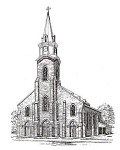Father Barron on ‘Noah’! More!
From: National Catholic Register
by Steven D. Greydanus Wednesday, April 02, 2014
Father Robert Barron is one of the Church’s best commentators on popular culture today, so I’ve been waiting for his take on Darren Aronofsky’s Noah. He doesn’t disappoint.
I’ve often mentioned in my extensive coverage of Noah that the film relies on the Jewish midrash tradition, but a point I wound up dropping from my first review (mostly for space reasons in a very long review) is that the film essentially is a cinematic midrash. I’m delighted to see that Fr. Barron takes up that point for me:
“Noah” is best interpreted, I think, as a modern cinematic midrash on the Biblical tale. The midrashim—extremely popular in ancient Israel—were imaginative elaborations of the often spare Scriptural narratives. They typically explored the psychological motivations of the major players in the stories and added creative plot lines, new characters, etc. In the midrashic manner, Aronofsky’s film presents any number of extra-Biblical elements, including a conversation between Noah and his grandfather Methuselah, an army of angry men eager to force their way onto the ark, a kind of incense that lulls the animals to sleep on the ship, and most famously (or infamously), a race of fallen angels who have become incarnate as stone monsters.
Responding to the odd (to me) “Rock People” meme, Fr. Barron writes that the Watchers “are not really as fantastic or arbitrary as they might seem at first blush,” and connects the dots from Genesis 6 to Enoch to the great hymn “Ye Watchers and Ye Holy Ones” (which I’ve often sung, but never connected to Enoch).
Most importantly, Fr. Barron writes, “this contemporary midrash successfully articulates the characteristically Biblical logic of the story of Noah”:
First, it speaks unambiguously of God: every major character refers to “the Creator.” Secondly, this Creator God is not presented as a distant force, nor is he blandly identified with Nature. Rather, he is personal, active, provident, and intimately involved in the affairs of the world that he has made. Thirdly, human beings are portrayed as fallen with their sin producing much of the suffering in the world…Fourthly, the hero of the film consistently eschews his own comfort and personal inclination and seeks to know and follow the will of God…God, creation, providence, sin, obedience, salvation: not bad for a major Hollywood movie!
Fr. Barron even picks up on an ecclesiological point that flickered through my mind watching the film, which I neglected to jot down and later forgot:
There is a minor scene in the film which depicts some members of Noah’s family administering the sleep-inducing smoke to the animals. They look, for all the world, like priests swinging thuribles of incense around a cathedral. I’m quite sure that this was far from the mind of the filmmakers, but it suggested to me the strong patristic theme that Noah’s Ark is symbolic of the Church.
(Spoiler warning: This point also has theological applications to another character who doesn’t belong on the ark. In his parables Jesus likens the kingdom of heaven to a dragnet in which not every fish is good and a field in which not every shoot is wheat; these things are all sorted in the end.)
Read Fr. Barron’s full comments.
You should also read Eastern Orthodox film critic Peter Chattaway of Film Chat, not just because he’s my friend, but because he’s paid closer attention to Noah than any other Christian journalist I’m aware of, and because he’s full of fascinating insights. He’s seen the film twice and written first impressions and second impressions after each screening. From the former:
I said on Twitter recently, a movie like, say, Son of God (and the mini-series that preceded it) is essentially a crowd-pleaser: it flatters us by giving us a Jesus we expect to see, saying things we expect him to say; at times it even encourages an us-vs-them mentality where other, suppler Jesus films have aimed for something better.
Noah doesn’t do that. Yes, true, it has Noah and his family squaring off against Tubal-Cain and his minions. But there are complexities on all sides, and rather than flatter us that we happen to be on the right side, it really compels us to ask just where true righteousness is ultimately to be found.
And that is a very good question to be left with when the lights come on.
From the latter:
Noah is not a perfect film by any stretch. It has plot holes and it is weak on some of the key themes in Genesis. And Noah is certainly not a film for everybody; I can’t think of a single Aronofsky film that even tries to be all things to all people.
But it just so happens to be the kind of film that taps into a few of my favorite subjects, from obscure Bible history and ancient mythology to the science-and-religion debate, and it is made by someone who has been passionate about this project for years and knows how to talk about it knowledgeably — so on whatever level I may love this film, my love is true.
That last paragraph speaks for me too, and it’s why I’ve found myself devoting so much time and energy to this film.
Peter has also provided one of two excellent responses to an article that’s gotten a lot of attention, alleging that Noah subverts reshapes the biblical story into a worldview of Gnosticism and/or Kabbalism (heterodox Jewish mysticism).
There are serious problems with this article that I hope to write a bit about at some point, if I have time, but for now, a couple of links:
Ryan Holt: Is Darren Aronofsky’s Noah Gnostic?
Peter Chattaway: No, Noah is not Gnostic
More to come, hopefully.
P.S. See also everything SDG on Noah, including my interviews with Vatican Radio, NBC News, EWTN Nightly News and more.


